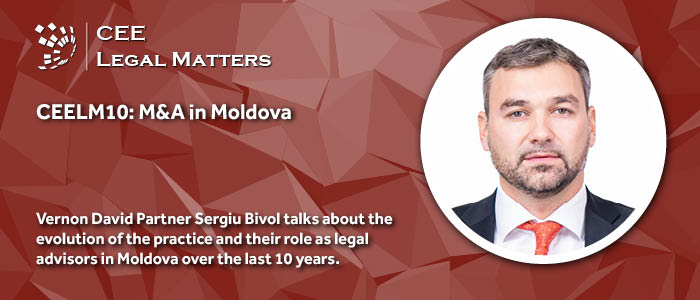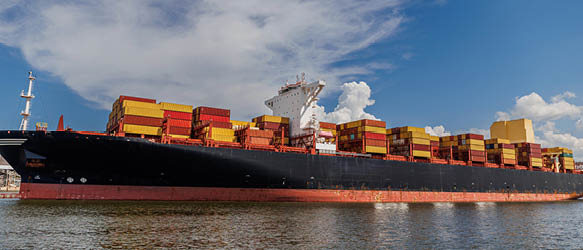Vernon David Partner Sergiu Bivol talks about the evolution of the practice and their role as legal advisors in Moldova over the last 10 years.
CEELM: In the last 10 years, what types of projects have been keeping your firm’s M&A team busy, and how has its focus evolved over time?
Bivol: Over the past decade, our M&A team has been involved in a variety of projects spanning different industries. One of our significant projects was in the telecommunications sector in 2016 when Orange Moldova acquired the biggest local cable and pay TV operator Sun Communications. This marked one of the largest transactions in the country. Following this, we transitioned into the pharmaceutical market, assisting one of the largest pharma companies in Moldova, Farmaprim. Notably, the acquisition of a major pharmaceutical facility by Amring, a global pharma industry leader, stands out as the most substantial transaction in the past decade. The pharma sector continued to draw investments, although not at the same scale.
The banking sector also witnessed a surge in M&A activities, largely triggered by a well-known 2014 fraud case. This set off a series of transactions, including OTP acquiring Mobiasbanca, Moldindconbank being acquired by Bulgarian investor Doverie-Invest, the biggest Romanian bank Banca Transilvania acquiring Victoriabank, and European micro-finance company IuteCredit making history by acquiring Energbank in Moldova. Notably, the momentum in the banking sector persisted, with Victoriabank acquiring BCR (part of the Erste Group) in 2022-2023.
In parallel, the IT industry became very active after legislative amendments in 2015-16, attracting European investors due to preferential tax regimes and a thriving IT park. Recently, the energy sector, particularly in renewables, has also experienced notable movement.
CEELM: Looking back at the last 10 years, what were the most demanding periods in terms of workload, and what do you believe contributed to them?
Bivol: The period around 2017 marked a significant shift, with a notable acceleration in M&A activities. Prior to 2017, progress was relatively slow, but post-2017, there was a surge, driven by changes in the banking system and corporate governance, triggered in part by the notable banking fraud I mentioned. Moldova’s increased visibility in the investor market, coupled with political changes, positioned it as a true European country, contributing to the surge in M&A activities.
Despite a global pause in economic activities during the COVID-19 pandemic, the legal industry, particularly in terms of litigation and restructuring, experienced an unexpected boom, making the pandemic years surprisingly productive for us.
CEELM: How would you describe the shifts in the profiles of your clients over the last decade?
Bivol: From our experience, in the last few years, there has been a noticeable change in terms of the strategic investors expanding their businesses into Moldova. Initially, Russian investors were rather prevalent, attracted by the bilingual environment as a transition point to the Romanian market. However, there has been a decline in Russian interest over time. In contrast, there has been a growing interest from US investors, especially in the post-2017 period.
CEELM: In terms of needs, have you noticed new expectations from clients over time?
Bivol: Naturally, the increase in M&A activities has led to a rise in demand for proficient M&A lawyers. While litigation experienced a resurgence during the pandemic, there is a growing need for expertise in energy, particularly renewables, and fintech. Clients consistently emphasize qualities such as attention to detail, meeting deadlines, and delivering quality work. However, one thing that is relatively new from our perspective is an increasing preference for law firms with international experience, especially for cross-border deals.
CEELM: How did Moldova’s legislative and regulatory framework evolve, and what have been the main highlights?
Bivol: In the last three years, substantial upgrades to corporate legislation have occurred, which aligned Moldovan laws with Western trends and institutions. Amendments were aimed at increasing the quality of the legal framework, making Moldova more attractive to investors. Changes in the energy sector, driven by a desire to liberalize the market, and adjustments in the banking sector post the 2014 fraud case have also presented challenges and opportunities.
CEELM: Looking ahead, how do you believe the practice will develop? What will be the major focus 10 years from now?
Bivol: I believe that the future holds a strong focus on renewables, fintech, and IT in particular. We expect that Moldova’s progress toward EU accession will create a pattern similar to Romania’s pre-accession period. The M&A landscape is likely to see increased interest from strategic investors expanding into Moldova. Additionally, the expertise gained from legislative changes positions Moldova as an attractive destination for foreign investors, with the legal industry playing a crucial role in facilitating these transitions.
Vernon David is CEE Legal Matters' Practice Leader for Corporate/M&A in Moldova for 2024 – learn more here.
This article was originally published in Issue 10.11 of the CEE Legal Matters Magazine. If you would like to receive a hard copy of the magazine, you can subscribe here.

















